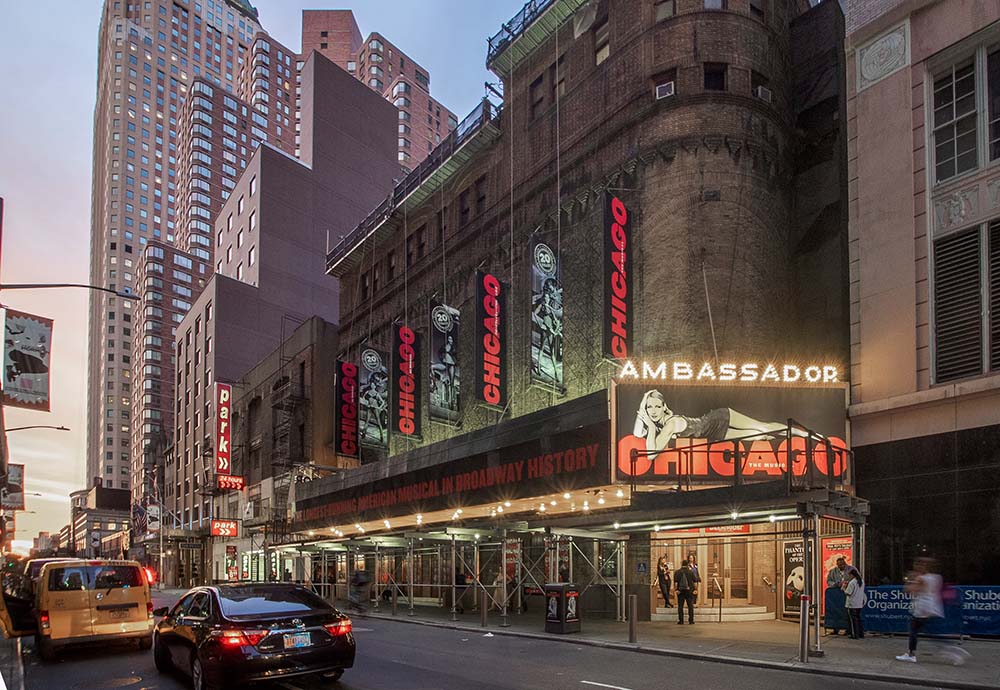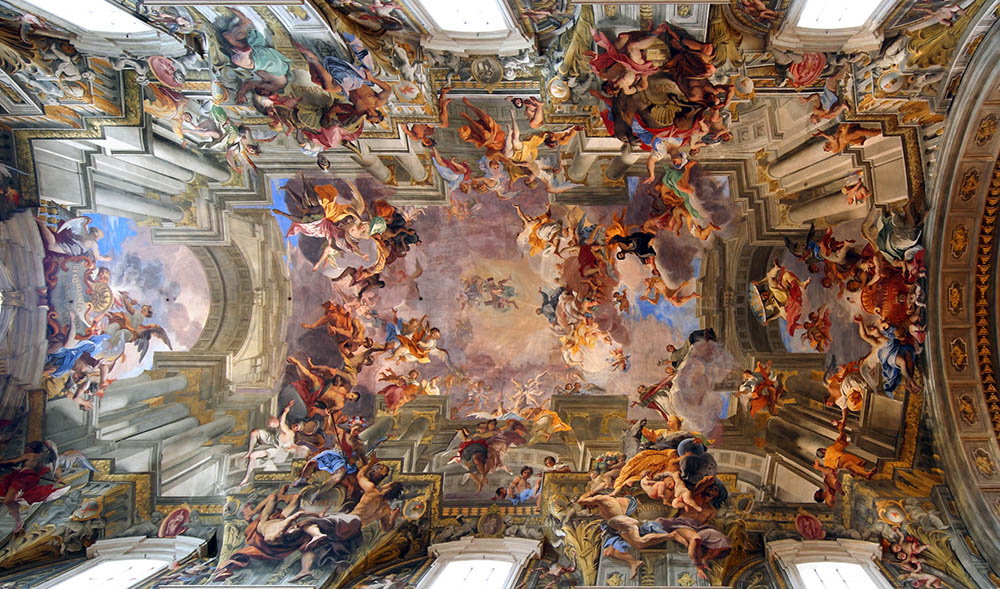
Pre-pandemic, the Ambassador Theatre in New York City in 2019 (Wikimedia Commons/Ajay Suresh)
It's early evening on Thursday, Sept. 16, and I'm walking through the Broadway district of Manhattan, on my way to the Ambassador Theater. It's like a hundred other times that I've been here: the flickering screens of Times Square dance around us, the marquees on the cross streets alight with the promise of so many journeys to take, stories to tell. And everywhere there are people like me, eager with the promise of what is to come.
But tonight is not like those hundred other times for any of us. Broadway's stages have been dark for 18 months, and much of our lives, too.
As I walk, I keep checking my pockets, not to make sure I have my wallet, keys or phone, but to reassure myself I haven't dropped any of the three masks that I've brought with me.
Since I moved back to New York two months ago, I've been mostly wearing a black cloth mask I got at the UCLA bookstore just before I moved (now and forever, go Bruins). But it's pretty thick and I keep thinking back to the challenge of the many hours I spent masked on the plane flight from Los Angeles in July. So I've brought along two others that seem thinner, and also crossed my fingers that the Ambassador will allow us to drink during the show. I have never sipped ginger ale more slowly than I did on that flight.
As I approach the line, a masked attendant asks us to put on our masks now and have our vaccination cards and identification ready. No one complains or even hesitates. A masked lady walks by quietly asking whether any of us have an extra ticket.
I'm here to see "Chicago", the searing 1975 Kander and Ebb based-on-a-true-story musical about two women who try to turn murders they committed into careers in showbiz. This particular production has been on Broadway for 25 years — it's the longest-running musical revival, also the longest-running American musical in Broadway history and the very rare show that never seems to get long in the tooth, maybe because it's just such a challenge to perform. Ann Reinking's Bob Fosse-inspired choreography is electric to watch, but pinpoint in the precision required of every single finger and toe.
A couple of my friends had posted about how emotional going back to the theater had been for them, the memories it had brought back, the sense of loss and yearning they'd experienced for all these months. But as I got into the theater and settled into my seat, I was more struck by the lushness of the sound of all of us there together. There's an unexpected quiet to be found in the midst of a chatting crowd that has always given me great peace. I find myself sinking gratefully back into the experience of being with other people and not being afraid.
Advertisement
If I'm being honest, the first act proves a little flat. Older murderess Velma seems to be playing things a bit broad for my taste; she's got none of the steel of a Bebe Neuwirth or Catherine Zeta-Jones.
Also, I'm in the first row at the start of the left side — I couldn't figure out why it was such a cheap seat when I bought it, but now I know: It's because the choreography of many of the big numbers are aimed at the middle of the house. Sitting on the edge is a bit like you're watching the show being performed for others at times, rather than being immersed in it yourself.
Then about halfway through, a strange thing happens. One of the actresses looks right at me — and not just for an instant; as the song goes on, she holds my eyes. Then out of nowhere she gives me this incredible smile.
And suddenly I'm back in an urgent care center in Los Angeles early in the pandemic, waiting to get the results of a COVID-19 test and absolutely terrified at the possibilities. Standing across from me is a nurse, wearing a face shield and no doubt full of her own fears. Yet as she looks at me, she smiles with infinite kindness.
The song goes on, the choreography sweeps the actress away, and I am breathless in a whole different way than I was back then. I spend the rest of the act lost in that moment of connection and charity.
At intermission, I stand near my seat and drink from my bottle of water. It's actually the first time I've taken off my mask since I got in the theater. I hadn't even really thought about it. It's weird what you can get used to. I note that the whole packed house is doing really well about keeping masked.
As I look out on them all, again I find myself drawn down unexpected roads. It's the people up in the balcony, the way they look down on us, it reminds me of all the people we've lost in the last year, how far they are all from us now. I think of my Aunt Pat, who died during the pandemic; a Jesuit friend who didn't die of COVID-19 but passed away as it tore through his community; so many others that continue to die of this horrible virus, never to be seen by us in this life again.
Then the moment shifts, and I'm staring up at the ceiling of the Church of Sant'Ignazio in Rome.
In the 16th century a Jesuit brother named Andrea Pozzo painted the ceiling to appear as though the church extended all the way into the heavens. Around the sides, angels and characters from Scripture engage with each other, and anywhere that you stand in the church, at least one of those characters looks directly at you.

The ceiling of the Church of Sant'Ignazio in Rome, painted in the 16th century by Italian Jesuit Br. Andrea Pozzo (Wikimedia Commons/Bruce McAdam)
It's just a detail and not one I ever hear people talk about, but to me it's the most profound part of the experience of that ceiling. It's like the church itself is telling us that we are a part of the story that we celebrate there, not observers to something that has already happened but main characters in the newest episode, the next part of the story. And those above look down on us with encouragement, our own personal communion of the saints, my aunt and Terry and all our friends not gone but there among them.
The second act begins with an entr'acte during which a trumpeter with a great shock of white wavy hair stands, points a finger at someone in the cast and absolutely wails. It's an explosion of joy and passion that knocks me completely off my seat, I think because it's the first moment in the show when someone has completely cut loose. "Chicago" is a story about artifice, about people hiding who they are. It's sexy and delightful, but so controlled.
After eighteen months, I am tired of holding back, tired of thinking about what I've touched and who is around me and where is my mask and is this tickle in my throat significant. I want to be able to just throw it all away, pick up a horn and blow.
In fact, the second act is more and more filled with emotion, as all of aspiring celebrity murderess Roxie's machinations can't quite bring her the success she wants. But the high point of the show comes completely out of the blue in the form of her goofball patsy of a husband, Amos. He's had an Uncle-Fester-but-sweet vibe the whole show, and as he steps forward to sing about what it's like to be ignored by everyone we're ready for laughs.
Instead, he sings with a quiet grief and eventually a rage that rips our hearts out. He's the first character to actually open up to us, and after two hours of con jobs the effect is devastating. As the song fades and we head into the finale, I have this feeling like I was just with Moses peeking momentarily behind the curtain to witness God passing by.
After the show, I wander home, dazed and grateful. Everything looks different now — the lights brighter and warmer, the world less predictable, but in a way that is finally once again exciting rather than terrifying.
Why do we go to the theater? It's to be transported, I think — sometimes to the past, sometimes to friends and family far away, sometimes to a whole new world. But for me the stage is always a place of revelation, too, a space where something will be uncovered in front of me and also within me. Some days it looks like the cigar box of Star Wars figures you buried as a kid. Some days it humbles you with the nakedness of its truth. Some days it might burn you to the ground.
It's always new and all as it has been a hundred times before.




